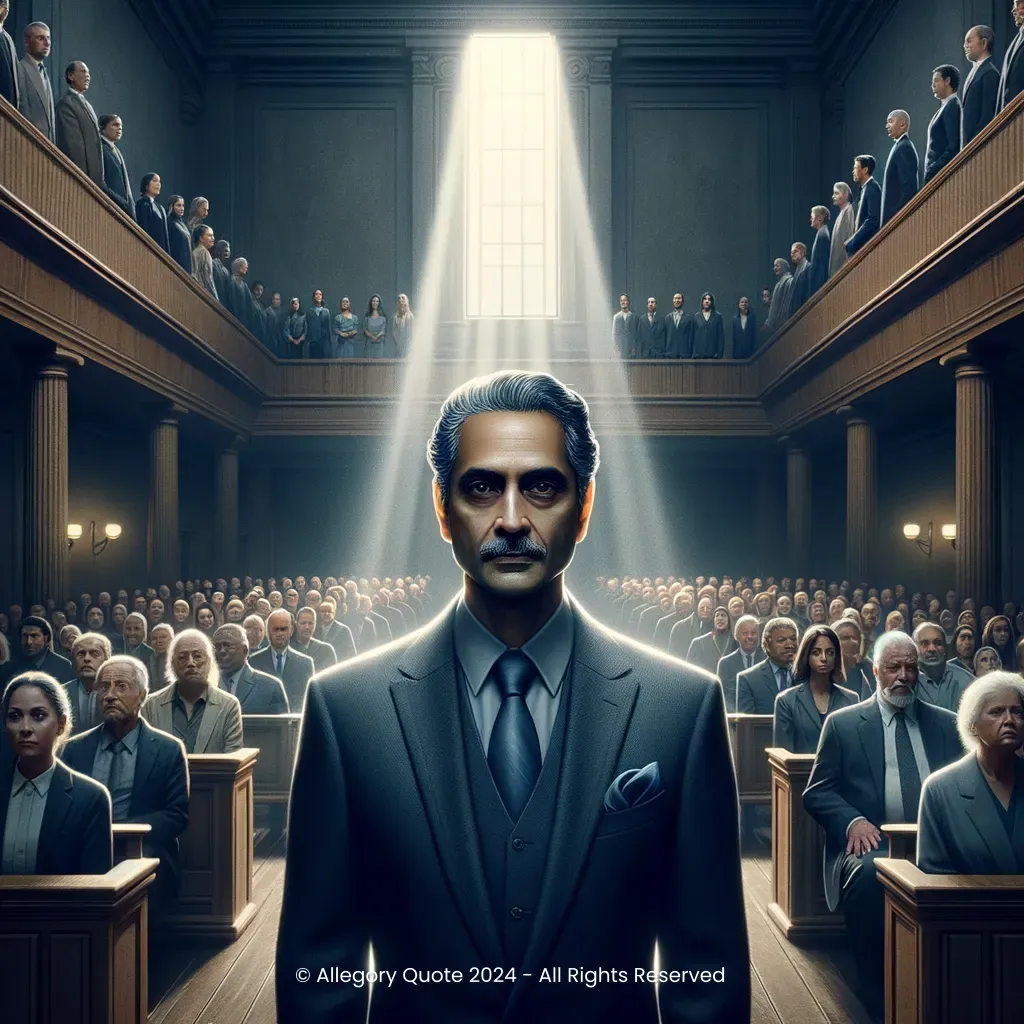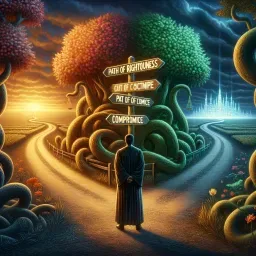I am not bound to please thee with my answers

0
0
0
0
- Meaning
- The quote "I am not bound to please thee with my answers" signifies a declaration of independence and defiance. Shylock is essentially saying that he does not have to conform to others' expectations or desires, particularly when it comes to his beliefs and responses. This highlights themes of autonomy and conflict, as Shylock defends his actions and principles against societal pressure and judgment.
- Allegory
- The image elements include a resolute figure (Shylock) standing in a grand courtroom, representing independence and defiance. The courtroom setting with its majestic architecture signifies societal expectations and legal battles. The varied expressions on the onlookers' faces reflect the different types of societal judgment and pressure faced by individuals who stand up for their beliefs. The beam of light represents truth, justice, and the moral high ground that Shylock holds in this scenario. Together, these elements evoke a powerful scene of courage, autonomy, and the struggle for fairness.
- Applicability
- This phrase can be extremely relevant in personal life, especially in situations where one feels pressured to conform to someone else's expectations or demands. It can serve as a reminder to uphold one's values and speak one's truth, even if it might not be pleasing to others. In everyday scenarios, such as at work or in social interactions, this expression supports the importance of being authentic and assertive in one's convictions.
- Impact
- The impact of this quote has been significant in literature and theater. It is often cited in discussions about autonomy, self-expression, and the refusal to succumb to unfair demands. The broader play is celebrated for its exploration of justice versus mercy and the human condition, engaging audiences in valuable ethical discussions.
- Historical Context
- "The Merchant of Venice" was written by William Shakespeare, probably between 1596 and 1599. During this period, England was seeing substantial political and social shifts. Anti-Semitic sentiments were prevalent, and the play reflects and critiques these biases through the character of Shylock and his interactions with others. The quote emerges from a context laden with prejudice, legal battles, and the quest for fairness.
- Criticisms
- This phrase and the character of Shylock have sparked significant controversy, mainly due to the portrayal of Shylock as a Jew in a negative light. Some interpret this portrayal as Shakespeare reinforcing anti-Semitic stereotypes, while others argue it invites audiences to sympathize with Shylock's plight against a prejudiced society. The complexity of Shylock's character and the ethical questions the play raises continue to provoke debate among scholars and audiences alike.
- Variations
- Variations of this phrase across different cultures emphasize the universal theme of authenticity and independence. While the core message remains the same, expressions of this idea may appear in different forms around the world. For instance, the Spanish phrase "No soy moneda de oro para caerle bien a todos" translates to "I am not a gold coin to be liked by everyone." While the words differ, the sentiment of not needing to please everyone is shared.
-

To weep is to make less the depth of grief.
-

I cannot lose the only thing that keeps me alive: hope. A word that is often with us in the morning, gets wounded throughout the day, and dies at dusk, but resurrects with the dawn.
-

No legacy is so rich as honesty.
-

Veritas vincit.
-

Good night, good night! Parting is such sweet sorrow.
-

Gaudeamus igitur.
-

When sorrows come, they come not single spies, but in battalions.
-

This above all: to thine own self be true, and it must follow, as the night the day, thou canst not then be false to any man.
-

To do a great right, do a little wrong.
-

To be, or not to be, that is the question.
-

If to do were as easy as to.
No Comments